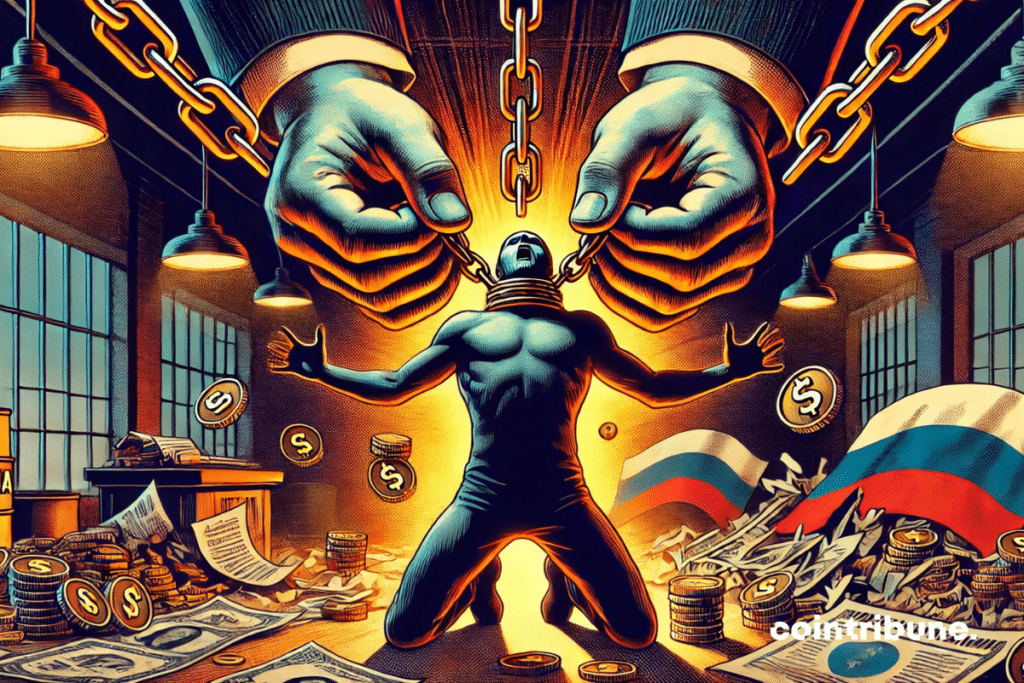Russian Economy Struggles Under Ukraine War’s Weight
As the war in Ukraine continues, the economic consequences for Russia are beginning to be felt more acutely. Initially noted for its resilience in the face of one of the most severe sanctions regimes in modern history, the Russian economy today shows clear signs of slowing down. Inflation is accompanied by a sharp rise in interest rates. Meanwhile, the fragility of the ruble, which is constantly falling against the yuan, reflects a growing dependence on China, Moscow’s main trading partner.

An unprecedented war effort that weakens the Russian economy
Since the beginning of the war in Ukraine, Russia has significantly increased its military spending, accounting for 40 % of its total budget for defense and security. This figure, which represents 8 % of GDP, had not been reached since the Cold War. This is an unprecedented financial effort in the country’s recent history. In 2024, this spending is expected to grow by 25 %, totaling 17 trillion rubles (170 billion dollars), according to official budget forecasts. This massive allocation reflects the Kremlin’s determination to maintain its military effort, despite the heavy pressures exerted on its national economy.
To support this spending, the Russian central bank has been forced to raise its key interest rate to 21 %, an unprecedented level in two decades. While this policy aims to contain runaway inflation, currently estimated at 8 %, it has direct repercussions on the population and businesses. Households see their purchasing power erode, while businesses face prohibitively high borrowing costs. In July, the removal of subsidies on mortgages, which until then allowed borrowing at 8 %, led to a halving of new loans. Thus, this situation has plunged the real estate market into a brutal slowdown. Meanwhile, corporate bankruptcies have surged by 20 % this year, a clear signal of the weakening of the Russian economic fabric. The situation imposes unprecedented economic sacrifices, illustrating the growing tensions of a model under pressure.
A currency under pressure and a growing dependence on China
This depreciation of the ruble against the yuan, down 10 % this year, illustrates Russia’s increasing isolation on the international economic stage. Such a situation also reflects a growing dependency on China, which now plays a central role in Russian foreign trade. Beijing supplies more than 90 % of the microelectronics used in Russian weapons, including drones, missiles, and tanks. Although strategic, this collaboration is costly, as it subjects Moscow to the conditions imposed by its Asian partner. This state of affairs exacerbates external economic imbalances. Moreover, it complicates the Kremlin’s monetary and budgetary management.
Domestically, the economic situation continues to deteriorate. The International Monetary Fund anticipates limited growth of 1.3 % for Russia in 2024, compared to 3.6 % in 2023. This economic slowdown is directly related to rising borrowing costs, which hinder investments, as well as the loss of skilled labor, mobilized en masse on the front. Furthermore, the priority given to military spending diverts essential resources from other economic sectors. This context further exposes the Kremlin to major financial challenges, with an overheated economy and increasingly limited military funding prospects. In the absence of strategic adjustments, these tensions could permanently impair Russia’s ability to sustain a prolonged war effort.
The Russian economy faces growing challenges, caught between intensive war efforts and a growing dependence on its external partners. This fragility of the ruble and persistent inflation could force the Kremlin to reassess its economic priorities. While Moscow hopes for a favorable geopolitical change, particularly with Donald Trump’s potential return, this strategy remains uncertain. The ability of Russia to sustainably bear the costs of this war remains an open question, with potentially decisive implications for its economic and political future.
Maximize your Cointribune experience with our "Read to Earn" program! For every article you read, earn points and access exclusive rewards. Sign up now and start earning benefits.
Diplômé de Sciences Po Toulouse et titulaire d'une certification consultant blockchain délivrée par Alyra, j'ai rejoint l'aventure Cointribune en 2019. Convaincu du potentiel de la blockchain pour transformer de nombreux secteurs de l'économie, j'ai pris l'engagement de sensibiliser et d'informer le grand public sur cet écosystème en constante évolution. Mon objectif est de permettre à chacun de mieux comprendre la blockchain et de saisir les opportunités qu'elle offre. Je m'efforce chaque jour de fournir une analyse objective de l'actualité, de décrypter les tendances du marché, de relayer les dernières innovations technologiques et de mettre en perspective les enjeux économiques et sociétaux de cette révolution en marche.
The views, thoughts, and opinions expressed in this article belong solely to the author, and should not be taken as investment advice. Do your own research before taking any investment decisions.